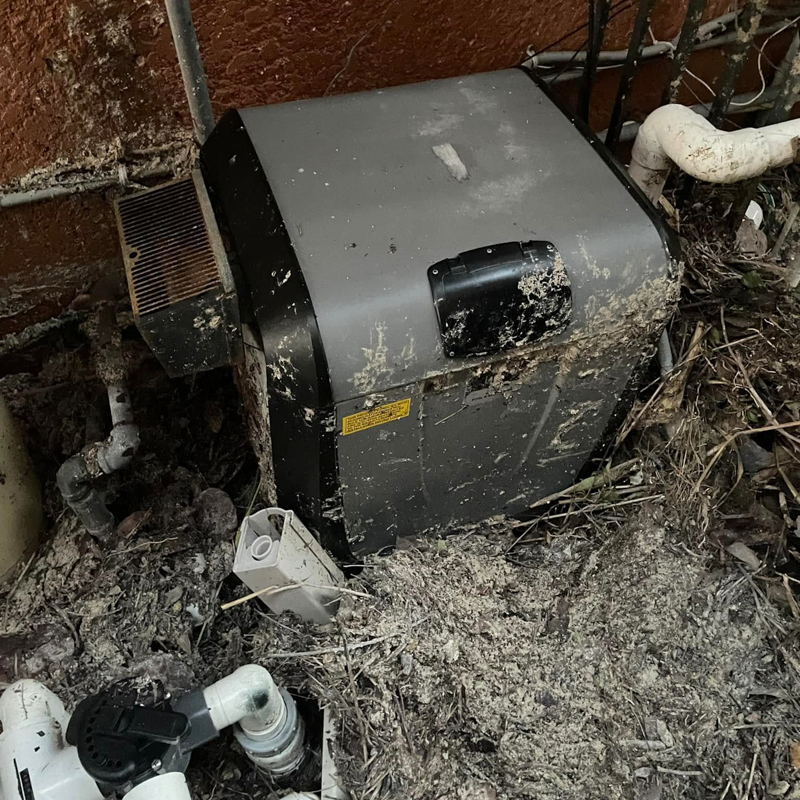Why You Must Replace Gas Pool Heaters Flooded by Ocean Water
If your gas pool heater was recently flooded by ocean water due to hurricanes or coastal storms, it’s crucial to assess the damage. Ocean water poses unique risks to gas-powered equipment, especially pool heaters, due to its salt content and conductivity. Here’s why replacing a gas pool heater after saltwater flooding is essential for safety and performance.
1. Saltwater Corrosion of Internal Components
Ocean water is highly corrosive, thanks to its salt content, and when it floods a gas pool heater, it corrodes metal parts quickly. The internal components of a pool heater—including the gas valves, burners, and heat exchangers—are particularly vulnerable. This corrosion compromises the heater’s structure and function, causing it to deteriorate and eventually fail.
Why Replacement Matters: Even if the heater appears to function after drying out, the salt damage will progressively weaken key parts. This cumulative corrosion leads to reduced efficiency, random breakdowns, and higher repair costs, which are avoided by opting for a full replacement.
2. Increased Electrical Short-Circuit Risks
Saltwater flooding presents an increased risk of electrical short circuits. Saltwater is much more conductive than freshwater, so it easily disrupts the heater’s electrical connections. This can result in short circuits, which may cause overheating, sparks, or even fires.
Prioritizing Safety: A flooded gas pool heater, especially one exposed to saltwater, poses a significant safety hazard. Attempting to salvage a heater after saltwater exposure risks your safety and your equipment. Replacing the heater is the safest choice, ensuring all components function without risk of electrical issues.
3. Gas Line Damage and Safety Concerns
Gas heaters have lines, valves, and connections that are highly sensitive to salt and corrosion. Ocean water flooding can cause blockages or corrosion in these gas lines, leading to leaks or reduced gas flow. A gas leak in or around a pool area can be dangerous, with risks of fires or explosions.
Why Replacement is Best: Even minor damage or corrosion to gas lines or valves can lead to significant long-term issues. A new pool heater ensures a secure, reliable gas connection, which minimizes any risk of leaks and dangerous malfunctions in the future.
4. Reliability Issues and Unexpected Shutdowns
A saltwater-flooded heater may function briefly after drying, but the lingering effects of corrosion make it far less reliable. The heater’s components are more likely to fail over time, and these breakdowns could occur during the peak pool season when you need it most.
Value of a Replacement: Investing in a new gas pool heater guarantees more consistent, dependable performance. By replacing a damaged heater, you avoid the hassles of random shutdowns and costly repairs, ensuring your pool stays warm and ready when you want to use it.
5. Compliance with Health and Safety Standards
Most local regulations and insurance policies require replacing gas-powered equipment that’s been submerged in ocean water due to the safety risks involved. Failure to replace a flooded heater may void insurance coverage or violate local safety codes.
Staying Covered and Compliant: Confirm with your insurance provider and local authorities, as many will require a replacement to maintain compliance. This ensures your pool is safe, and you aren’t liable for potential accidents or damages.
Don’t Risk It – Replace Your Flooded Gas Pool Heater
Replacing a gas pool heater that’s been flooded with ocean water is essential for safety, compliance, and performance. Ocean water can cause irreversible damage and dangerous malfunctions in gas heaters, making replacement the best choice for both immediate and long-term benefits.
Examples of Gas Pool Heaters




If your pool heater was affected by recent flooding, Learn More about our experienced team for assistance. We’ll guide you in selecting the right replacement for your pool, so you can enjoy a safe, reliable, and perfectly heated pool year-round.








0 comments